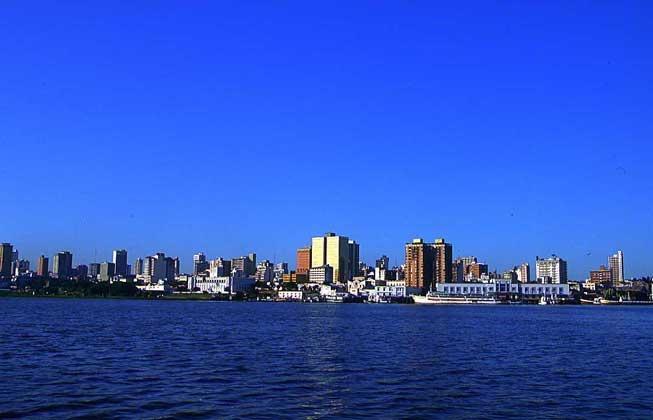The Republic of Paraguay
 Area - 406.8 thousand km2.
Area - 406.8 thousand km2.
Population - about 6.9 million people (90% - Spanish-Indian mongrels).
Capital - Asuncion (about 1 million inhabitants).
Official languages are Spanish and Guarani. Majority of the population are Roman Catholics.
National Day is celebrated on May 14 - the Independence Day (1811).
Currency is Guarani (USA $1 = 4,600 Guarani).
Political system. Paraguay is a presidential republic. According to the constitution of 1992, the head of state and government, and commander in chief of the armed forces is the president, elected for a five-year period and without the right on re-election for another term.
Fernando Armindo Lugo Mendez is the President of Paraguay (since 15 August 2008).
Federico Franco Gómez is the Vice President of Paraguay (since 15 August 2008).
Jorge Lara Castro is the Minister of Foreign Affairs of Paraguay (since 22 March 2011).
The highest legislative body is the National Congress, which is consisting of the Chamber of Senators (45 people) and the Chamber of Deputies (80 people). They are elected for five years (last elections were held in April 2008). Elections for both chambers of parliament are held every year in June.
The main political parties. F. Lugo government relies on a new political union "Front Guacu", which was created in March 2010, by a coalition of left-wing "Patriotic Alliance for Change" (by them F. Lugo became a president). It also included about twenty parties and movements of the left wing. The main opposition force is the National Republican Association - The Party "Colorado." There are also Authentic Radical Liberal Party, "National Union of Respectable Citizens" and the movement "Beloved Country."
Historical development. Starting from the XVI century, Paraguay was a part of the Viceroyalty of Peru and was a central outpost of Spain in the basin of river La Plata. Expeditions from Asunción established the largest Argentine cities, including Buenos Aires. Later, a part of the country became a part of the Viceroyalty of La Plata. During the anti-colonial wars in America, Paraguay gained the independence from Madrid (1811). As a result of the war with the "Triple Alliance" of Argentina, Brazil and Uruguay (1864-1870), the country suffered a crushing defeat, losing more than 80% of male population and almost half of its territory.
From 1870 to 1936, in Paraguay were changed over 30 presidents. Territorial dispute with Bolivia because of the area of the Northern Chaco caused a war between the two countries (1932-1935), where Paraguay won. This victory became possible because of the Russian officers-emigrants.
For over half a century, since 1936, the power in Paraguay was held by the military. In 1954 the representative of the Conservative Party "Colorado" general A. Stressner came to power, and established the country's totalitarian system, with a support on the top of an army and a powerful party apparatus. After the revolution of 1989, Paraguay took the road of gradual democratic reforms. In 1993, were held general elections, which resulted the first civilian president - the representative of the party "Colorado" H. Vasmosi.
On April 20, 2008, on presidential elections in Paraguay, a former priest F. Lugo won the candidate of the left-wing coalition of opposition forces. He ended the era of “Colorado”, which ruled more than 60 years.
Economy. Among trading partners of Paraguay has traditionally distinguished the MERCOSUR countries, the EU and the USA.
The basis of the economy is agriculture, which is characterized by the domination of large estates. It employs about half of the economically active population, made up 30% of its GDP and 90% of export. There are grown soybeans, cotton, sugar cane, wheat, corn, beans, cassava, peanuts, tobacco, citrus, etc. 56% of the country is covered by forests, rich and valuable wood breeds, 34% is pasture. Livestock is mostly extensive.
The share of industry in GDP is less than 30%. Leading industries are: food, wood, chemical and textile. Paraguay has significant water and electricity resources (on Parana River is one of the world's largest hydropower plant "Itaipu", capacity of 12,600 MW, which is both in Paraguay and Brazil), which not only completely satisfy its energy needs, but also allow to deliver it to neighboring countries.
Poverty and unemployment continue to be the relevant problems of socio-economic development.
Foreign policy. In foreign policy, the administration of F.Lugo focuses on the commitment to multilateralism, multipolar world order, the unification of international efforts in the fight against new challenges and threats, protecting the rights of migrant workers and compatriots abroad. Among the major foreign policy objectives is the provision of further sources of investment and markets.
Paraguay's main foreign policy priority is the participation in the integration processes in the South American space, especially in the Southern Common Market (MERCOSUR), by the position of solidarity of which, Paraguay acts on most of the key foreign policy issues.
Paraguay takes an active part in the work of the Union of South American Nations (UNASUR).
Science, culture and education. Paraguayan culture is inextricably linked to the traditions of the Guarani Indians. Guarani language alongside with Spanish is the official. Three quarters of the population speak two languages at once. In the music are traditionally distinguished guitar and the Paraguayan harp. A. Barrios and H. Asunson Flores are best known Paraguayan composers.
























